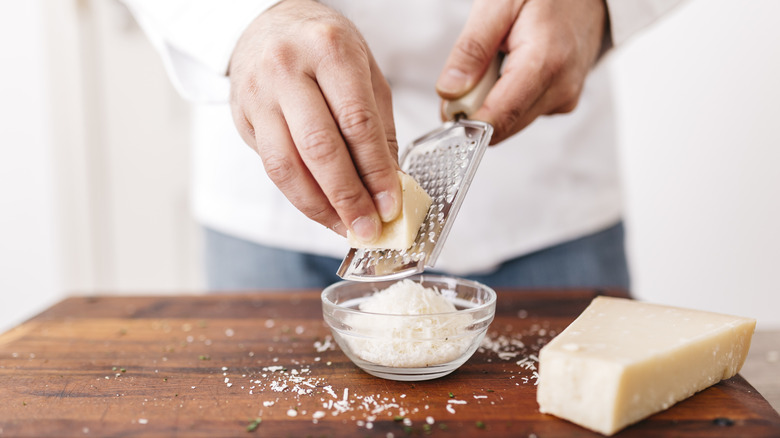The Classic Italian Cheese That Has More Protein Than An Egg
The idea that eggs aren't a healthy food choice is one of the many health myths people need to stop believing. In reality, eggs are packed with nutrients, including protein (approximately 6 grams between the white and yolk). But while that's impressive, eggs are hardly the only food that offers hefty amounts of protein. Aged cheeses can also pack a protein punch, and one of the biggest contenders of the bunch is parmesan.
Turns out, parmesan cheese is one of the healthiest cheeses you can eat. A single ounce of parmesan cheese contains 10 grams of protein, more than one-and-a-half times that of an egg. Plus, the protein in parmesan cheese is also complete, meaning it contains all the amino acids your body requires.
If you like the idea of getting as much protein as you can from nutrient-dense foods, you may find parmesan cheese a practical and tasty option. Plus, in addition to getting a hefty dose of protein, you may enjoy other unexpected benefits.
Parmesan: A hard cheese that's soft on your gut
For instance, you may discover that parmesan cheese is easier to digest if you're sensitive to the lactose found in dairy products. Because parmesan cheese is fermented longer than softer cheeses, it loses lactose. Parmesan cheese isn't lactose-free, but its lactose levels are low enough to make it tolerable for many people who normally avoid products containing lactose.
Let's talk about another win for parmesan cheese, which is an abundance of calcium. Parmesan cheese will supply you with about 26% of the recommended daily value of calcium, another key nutrient — and it's at a level that eggs can't match.
There's another unique and attractive aspect of the calcium (and protein) found in parmesan cheese: It's absorbed efficiently by your body. As registered dietitian Alexis Suban explains (via Cleveland Clinic), "Your body can absorb most of that calcium, and break down most of that protein really easily," adding that other foods "might have certain ingredients and nutrients you need, but your body struggles to break them down in the way you need them."
The pros (and cons) of parmesan cheese
Parmesan cheese is packed with vitamins, too. According to a 2017 review in Food Technology and Biotechnology, if you keep your daily intake of parmesan cheese at about 3.5 ounces (about 100 grams), you can meet your daily B12 and biotin goals as well. This may be important if you're trying to get your vitamins through foods rather than supplements.
Indeed, parmesan cheese has plenty of positives. Yet for all its advantages, parmesan cheese isn't perfect. In exchange for all the protein, calcium, low lactose, and key vitamins you're getting, you'll be eating a lot of sodium. The sodium content of 100 grams of parmesan cheese exceeds 1,800 milligrams, making it one of the saltiest types of cheese you can buy.
High sodium levels have been linked to a higher risk of cardiovascular disease. In fact, a 2020 review in Nutrients noted that high-sodium diets could increase a person's risk of heart disease by 19%. Therefore, if you're trying to lower your blood pressure or reduce your chances of stroke or heart attack, you need to moderate your parmesan cheese consumption or balance it with low-sodium food choices.


